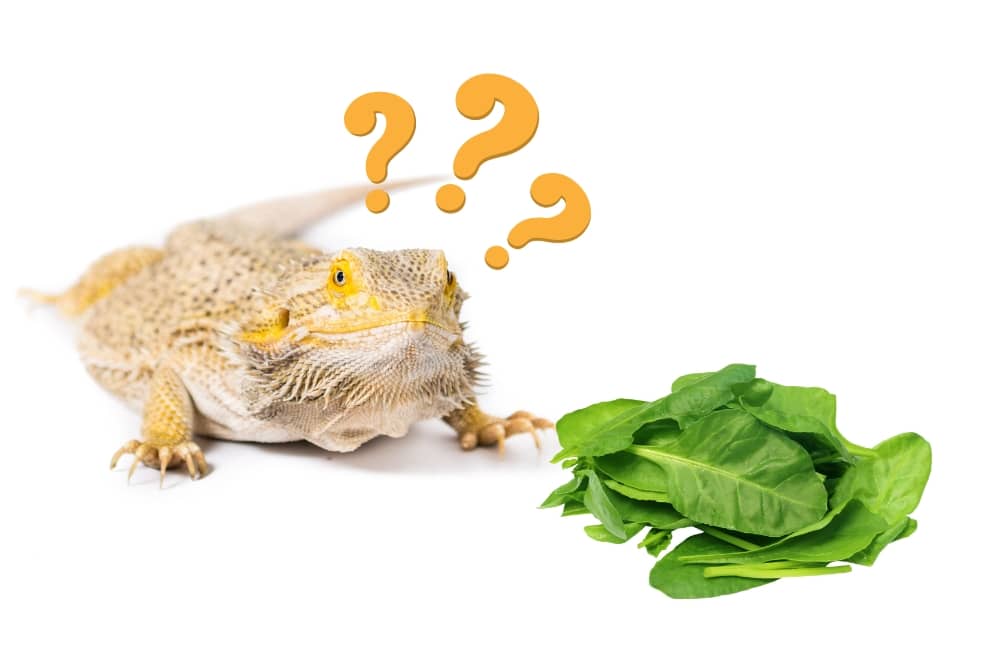Spinach is a green leafy vegetable renowned for its huge health benefits for humans. In fact, many physicians and nutritionists include spinach in the list of a few special foods that are considered superfoods for humans. This is so because spinach is a rich source of a lot of nutrients like iron, fiber, calcium, magnesium, phosphorus, vitamins C, A, B & K, etc. So humans can often enjoy eating such nutritious and healthy food; however, what about bearded dragons? Can bearded dragons eat spinach? How often can bearded dragons eat spinach?
Yes, our bearded friends can eat many leafy vegetables, and spinach is one of them. Though spinach is beneficial for bearded dragons, they can’t afford to eat it too often (we have discussed the reasons in the latter half of this post). Reptile experts and nutritionists don’t recommend offering spinach more than once a month and it should be fed in a very small amount.
Pros & Cons Of Feeding Spinach To Bearded Dragons
Before discussing the pros and cons of feeding spinach to bearded dragons, let’s have a look at the nutritional profile of spinach first.
| Amount/100g | Unit | |
| Energy | 23 | Kcal |
| Water | 92.4 | g |
| Carbohydrates | 3.63 | g |
| Fiber | 2.2 | g |
| Vitamin A | 3o6 | μg |
| Sugars | 0.42 | g |
| Vitamin C | 30.3 | mg |
| Magnesium | 93 | mg |
| Iodine | 6.1 | μg |
| Iron | 1.05 | mg |
| Vitamin B-6 | 0.214 | mg |
| Sodium | 1.07 | mg |
| Potassium | 460 | μg |
| Total lipid (fat) | 0.39 | g |
| Zinc | 0.42 | |
| Protein | 2.91 | g |
| Calcium | 67 | mg |
| Phosphorous | 41 | mg |
| Beta-Carotene | 3670 | μg |
| Manganese | 0.426 | mg |
Pros Of Feeding Spinach To Bearded Dragons
The table above clearly indicates that spinach has a lot of benefits to offer to our bearded friends. It is full of minerals like iron, potassium, manganese, magnesium, sodium, and zinc and has a sufficient amount of fiber. In addition, the sugar contents in spinach are very low, which is again a added bonus because high sugar diets can harm your beardies. Spinach also contains a reasonable amount of protein and different vitamins like vitamins A, B-6, C, K, and beta carotene.
However, from a beardies point of view, the calcium to phosphorus ratio is the most crucial aspect to be considered before offering any food. And the presence of more calcium than phosphorus makes spinach a favorable diet for beardies.
Cons Of Feeding Spinach To Bearded Dragons
While reading the pros section, you may be wondering why we have mentioned earlier that spinach should not be offered to bearded dragons often or why experts insist on feeding only a small amount of spinach occasionally. Your concern is valid; despite having such a healthy nutritional profile, spinach contains some ingredients that may harm beardies when eaten in large quantity. Let’s see why bearded dragons can’t enjoy a superfood like spinach often.
- The primary factor that makes spinach unfavorable for bearded dragons is oxalates. Spinach contains a lot of oxalates, and oxalates combine with calcium and other trace minerals hinder their absorption from the intestine into the body. So despite having a good concentration of calcium and other minerals in spinach, these nutrients will not be available for the body to utilize, thus leading to a deficiency of calcium and other vital minerals in the body. In particular, the deficiency of calcium can lead to a painful and life-threatening condition named MBD (metabolic bone disease).
- The second factor is the higher water content of spinach, as the table above indicates that spinach contains 92% water. Though feeding food with such a higher water level may be good when your bearded dragon is dehydrated, feeding such food in routine can lead to diarrhea.
Take Home Message
Though spinach has an amazing nutritional profile, it is not as beneficial for bearded dragons as humans. The higher water and oxalate contents make spinach an unfavorable food for beardies to eat often. However, it’s ok if they eat it occasionally in small amounts. Bearded dragons can also get useful nutrients (present in spinach) from other safe sources. Some good and safe spinach alternatives for our beardies are Collard Greens, Cactus, Turnip Greens, Dandelion Greens, Mustard Greens, Escarole, etc.

